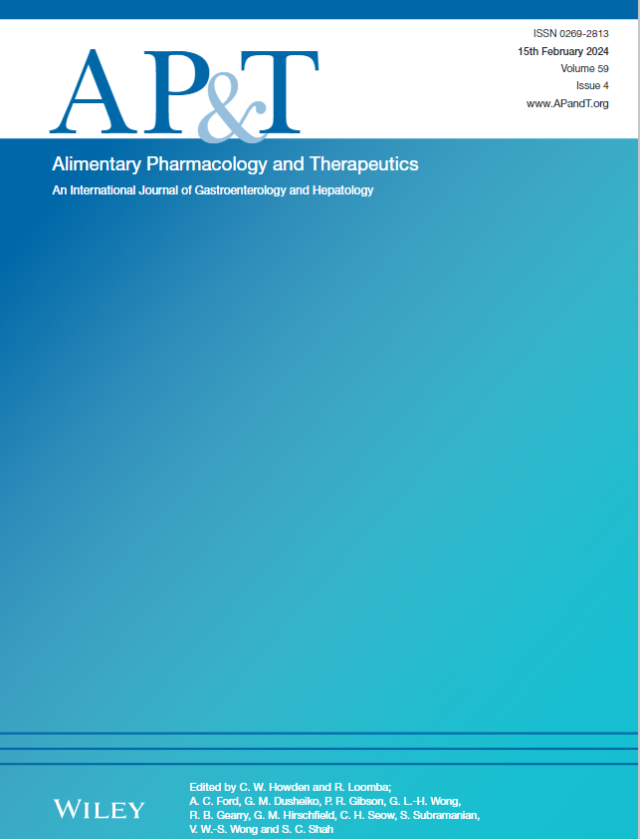Impact of non-selective beta blockers on further decompensation and death in decompensated cirrhosis: Benefit and risk stratification by MELD score.
IF 6.6
1区 医学
Q1 GASTROENTEROLOGY & HEPATOLOGY
引用次数: 0
Abstract
BACKGROUND Non-selective beta blockers (NSBBs) can reduce the risk of decompensation, but their impact on further decompensation has been rarely investigated. AIMS The aim is to evaluate the impact of NSBBs on further decompensation and death in decompensated cirrhosis stratified by the severity of liver disease. METHODS Overall, 332 decompensated cirrhotic patients were retrospectively included, of whom 149 used NSBBs. Kaplan-Meier and Nelson-Aalen cumulative risk curves as well as Cox regression and competing risk analyses were used to estimate the associations of NSBBs with further decompensation and death, if appropriate. Hazard ratio (HR) and sub-distribution HR (sHR) were calculated. Subgroup analyses were performed based on the model for end-stage liver disease (MELD) score at admission. RESULTS In the overall analysis, the use of NSBBs was not significantly associated with further decompensation in multivariate competing risk analysis (sHR = 1.09, p = 0.580). In the subgroup analysis of patients with a MELD score of ≤9, the use of NSBBs was significantly associated with decreased risk of further decompensation in multivariate competing risk analysis (sHR = 0.57, p = 0.021). In the subgroup analysis of patients with a MELD score of >9, the use of NSBBs was associated with increased risk of further decompensation in multivariate competing risk analysis (sHR = 1.45, p = 0.044). Regardless of overall and subgroup analyses, the use of NSBBs was not significantly associated with death in multivariate Cox regression analyses. CONCLUSION NSBBs may be beneficial for the prevention of further decompensation in cirrhotic patients with a MELD score of ≤9, but deleterious in those with a MELD score of >9.非选择性β受体阻滞剂对肝硬化失代偿期进一步失代偿和死亡的影响:获益和根据 MELD 评分进行风险分层。
背景非选择性β受体阻滞剂(NSBBs)可降低失代偿风险,但其对进一步失代偿的影响却鲜有研究。方法回顾性纳入了332例失代偿肝硬化患者,其中149例使用了NSBBs。采用Kaplan-Meier和Nelson-Aalen累积风险曲线以及Cox回归和竞争风险分析来估计NSBB与进一步失代偿和死亡(如适用)的相关性。计算了危险比(HR)和亚分布HR(sHR)。根据入院时的终末期肝病(MELD)评分模型进行了亚组分析。结果在总体分析中,多变量竞争风险分析显示,使用 NSBB 与进一步失代偿无显著相关性(sHR = 1.09,p = 0.580)。在对 MELD 评分≤9 分的患者进行的亚组分析中,在多变量竞争风险分析中,使用 NSBB 与进一步失代偿的风险降低有显著相关性(sHR = 0.57,p = 0.021)。在对 MELD 评分大于 9 分的患者进行的亚组分析中,在多变量竞争风险分析中,使用 NSBB 与进一步失代偿的风险增加有关(sHR = 1.45,p = 0.044)。结论NSBBs可能有益于预防MELD评分≤9分的肝硬化患者进一步失代偿,但对MELD评分>9分的患者有害。
本文章由计算机程序翻译,如有差异,请以英文原文为准。
求助全文
约1分钟内获得全文
求助全文
来源期刊
CiteScore
15.60
自引率
7.90%
发文量
527
审稿时长
3-6 weeks
期刊介绍:
Alimentary Pharmacology & Therapeutics is a global pharmacology journal focused on the impact of drugs on the human gastrointestinal and hepato-biliary systems. It covers a diverse range of topics, often with immediate clinical relevance to its readership.

 求助内容:
求助内容: 应助结果提醒方式:
应助结果提醒方式:


